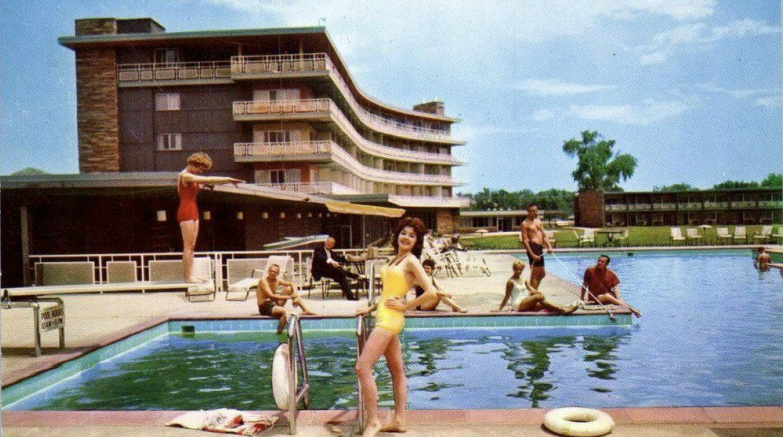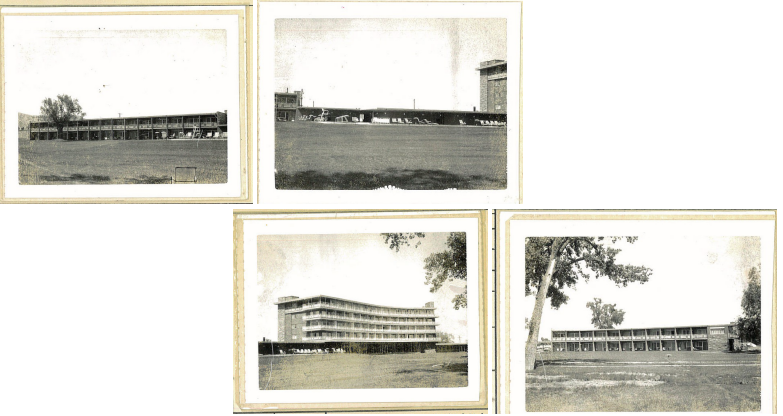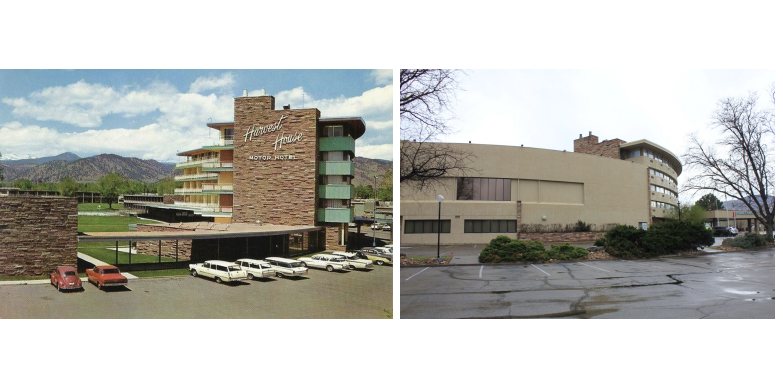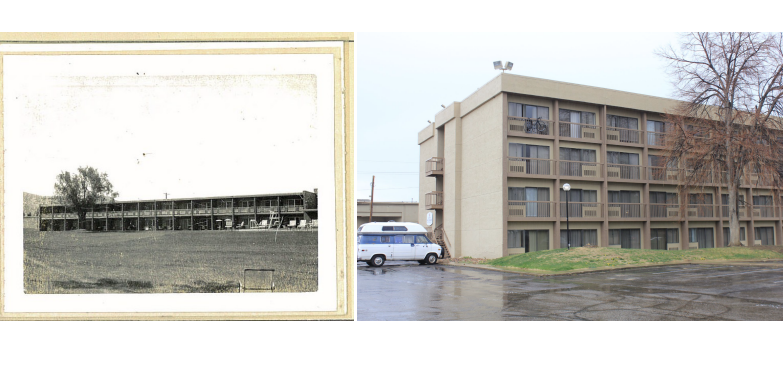
Boulder Historic Preservation

Audio By Carbonatix
The Millennium Harvest House hotel, a fixture of 28th Street in Boulder since 1959, is soon to be demolished and replaced with student housing for the University of Colorado.
Boulder’s historic preservation program and planning board have approved the demolition, but others argue the destruction will cause Boulder to lose an important piece of its history, including historian Carol Taylor, who has documented the progress of the hotel from dirt lot to golf course to soon-to-be construction site.
After gaining approval from the City of Boulder in August 2023, Georgia-based developer Landmark Properties officially purchased the hotel and the lot it sits on at 1345 28th Street in January for $71.9 million. The project proposes three four-story buildings that would house 900 bedrooms.
The developer is still working through final approval of the plan before construction begins, but with construction comes the demolition of the mid-century modernist Harvest House.
Taylor was hired in 2009, when the hotel turned fifty, to catalogue its history. She resumed that project in 2021 after hearing of the demolition plans while researching a different project at the Carnegie Library for Local History in Boulder, where she had run into another researcher who was putting together a report on the building as part of the demolition proposal.
After compiling the building’s history, Taylor believes the Harvest House should be preserved, despite a decision from the city stating that the physical characteristics of the building no longer maintain its historic character.
“At the time, it was a state-of-the-art modernist building, and it was going to be on the highway. It was really important because of automobile travel and summer tourists,” Taylor says. “It’s just a really big part of Boulder, so many milestones were celebrated there.”
She documents those milestones in her manuscript, The Rise and Fall of Boulder’s Legendary Harvest House Hotel.
History of the Harvest House Hotel
The architect for the building was Ralph Peterson, who also designed four buildings at the University of Colorado and other buildings in the state, such as the Colorado State Hospital in Pueblo and the Denver Federal Center.
“Peterson architects designed a bold five-story curved structure that embraced the natural beauty of Boulder Creek and allowed for a spectacular view of Boulder’s mountain backdrop, including the iconic sandstone slabs known as the Flatirons,” Taylor wrote in her manuscript.
After a grand opening in January 1960, the Harvest House became a cultural hub, with ballet shows, fashion luncheons and diving exhibitions in the pool to complement the conferences and business meetings that occurred at the hotel.

These images from the Boulder tax assessor show what the Harvest House looked like when it was first built.
Boulder Historic Preservation
Scientists also frequented the hotel, an element that Taylor argues should have factored into its preservation. The Harvest House hosted visitors from the National Bureau of Standards, the Atomic Energy Commission at Rocky Flats, the Ball Brothers Research Corporation and more.
Hometown astronaut Scott Carpenter had his welcome-home press conference there after returning from his mission to orbit the Earth in the Aurora 7 capsule in 1962. The hotel was built at an important time for the city, as the Hotel Boulderado had fallen into disrepair, leaving Boulder without an acceptable place to host large groups of visitors.
For a while, it was the closest place to the city to get a drink, as Boulder was still under alcohol prohibition until 1967 and the hotel technically sat outside city limits.
“The property had become a twenty-acre ‘island,’ completely surrounded by City of Boulder land,” Taylor wrote. But in 1967, the city voted to allow the sale of liquor, and the Harvest House was annexed into the city.
Waylon Jennings performed at the Harvest House in 1975. After that, the owners instituted live theater on the fifth floor, with a dining room and lounges rebuilt in 1976 and other outdoor amenities added shortly after.
In the 1970s, the hotel was owned by Tony Seibert, who gave a $15,000 donation to help get alternative radio station KGNU started. He also allowed the station to broadcast from a Harvest House-owned bungalow, according to Taylor’s manuscript.
In 1980, further renovations occurred that would later be the reason the hotel will be destroyed. Ownership added two stories to the wings of the hotel, closed off many of the decorative balconies and encased much of the building in stucco.
Lots of legendary parties happened at the Harvest House, especially after the advent of the Friday Afternoon Club, which were boisterous gatherings of culture and merriment. Some were documented in Newsweek, where allegations of rampant drug use caused a stir in the community.
The hotel’s name was officially changed to the Millennium Harvest House in 2002 after being acquired by London-based Millennium & Copthorne Hotels in 1999. It stayed that way until closing in January after the sale.
Has the Harvest House Lost its Architectural Integrity?
Despite all those stories and memories, a report required by the city to document the building’s history before it could be demolished concluded that the Harvest House wasn’t viable for preservation.
“Due to a loss of integrity, however, the hotel does not qualify for listing in the National Register of Historic Places or in the State Register of Historic Properties,” the report found. “Nor does it qualify for landmark designation by the City of Boulder.”
Taylor takes issue with the fact that the report was paid for by the developers. However, the city’s Historic Preservation staff came to the same conclusion when it reviewed the demolition application.

The city compared photos from 1959 and 2021 to determine that the Harvest House has lost its architectural integrity.
Boulder Historic Preservation
City staff reviews any buildings over fifty years old set to be demolished and refers those built before 1940 to its board for review.
The city’s historic preservation community expected that the Harvest House would become a landmark as soon as possible in 2009.
“Many of us involved in local history just took it for granted that the Harvest House would be a landmark,” Taylor says. “It was a no-brainer. It had everything required to be a landmark and had so much influence on shaping the city. When it didn’t get landmarked, I was just stunned.”
Because it was never pushed as a landmark, the hotel came up for review when developers wanted to replace it. The city’s review process considers the architectural, historic and environmental significance of buildings as well as its integrity, “which means that it hasn’t been changed so much over time that it no longer carries that architectural significance that it had,” explains Marcy Gerwing, principal planner with the City of Boulder.
That’s where the Harvest House lost out.
“It was a challenging one to review, because it was one of the most iconic mid-century buildings in Boulder, and it had historic significance for the cultural center that it was,” Gerwing continues. “But because the building had been changed frequently in the ’80s, after making site visits and doing photo comparisons and researching the history, our determination was the building had been changed so much that it no longer conveyed its historic significance.”
Although the city did require documentation of the building’s history before demolition, the Harvest House didn’t qualify for landmark status. Taylor still thinks the city got it wrong.
“This is by far the biggest public building [in Boulder] that is mid-century modern architecture, and I think it will be a huge loss if it’s demolished,” she says. “It’s very unique. There’s not another building like the Harvest House.”
According to Gerwing, although the curved form of the hotel and some of the stone facade remain, the revisions in the 1980s – like adding stucco, replacing decorative railings with enclosed balconies coated in stucco and replacing the windows – destroyed the character of the original mid-century design.

The addition of extra stories and stucco hurt the Harvest House’s character, according to the city.
Boulder Historic Preservation
Taylor points to the landmarking of the Marpa House in Boulder, a Buddhist living center and former Jewish fraternity that had major alterations but was still designated as a landmark in 2020 because of its importance to Buddhist history in Boulder.
“There were so many changes to that building over time, and it still went through landmarking, no problem,” Taylor says. “So it’s just got to be about the money, right?”
Boulder has a long-stated need for more housing, particularly affordable housing. Landmark Properties will pay the city cash in lieu of building affordable housing on the Harvest House site. The city can then use that money to build affordable housing elsewhere – but Taylor contends that the Harvest House could have been transitioned to housing.
“The saddest thing is that Boulder didn’t have to choose between preservation and housing on this one,” she says. “You could have had both. You could have had preservation and you could have had housing and sustainability. …Then Boulder would be living up to all of the values that it says it has.”
The Harvest House was built with fire-resistant and reusable steel. Its stone elements were also made of locally sourced sandstone, which Taylor says still looked beautiful in the fall of 2023 when the hotel was approved for demolition.
Historic Boulder, a nonprofit dedicated to historic preservation in the city, publicly questioned the proposal to destroy the Harvest House in 2022 but didn’t initiate the landmark process. The organization did not reply to multiple requests for comment.
Taylor says she’s disappointed that no other organizations dedicated to architecture or history in Boulder stepped up to fight for the hotel to gain landmark status. Only groups, not individuals, can file landmark applications in Boulder, so Taylor says she couldn’t do it herself. She also believes there wasn’t enough dialogue with the public.
“I would say that there hasn’t been an upswell of community interest in the demolition of this building,” Gerwing contends, though she says the city is aware that Taylor and Historic Boulder have been opposed.
“What [Taylor] has written is a really kind of beautiful tribute to this building,” Gerwing adds. “We wouldn’t expect a building, whether it’s fifty years old or 150 years old, to be exactly how it was when it was built. … There’s not, like, a mathematical equation to say, ‘Well, if you have X amount of material left, it has integrity or not.’ It’s more of a judgment call.”
Taylor is waiting sadly for the day demolition begins, which will be the final chapter in her manuscript.
“There are lots of people who have such fond memories of the Harvest House, and there are lots of people who know its significance in shaping Boulder, and there are people who need to know it,” she says. “It just makes me sad every time I talk about it. I get angry and then I get sad, but I think it’s a done deal.”
Landmark Properties has not yet announced a demolition date.